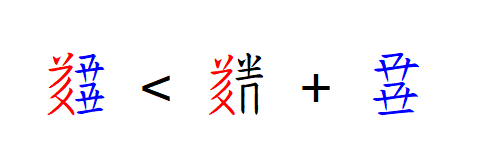
Sea of Tangut Characters @TangutSea
Tweet 1256928558297026561
Sunday, 3 May 2020 at 12:48
𘐶 [²jwo₃] 'to throw away, to discard' is constructed from the left side of 𘐉 [²vaq₃] 'to send, to release, to emit' and the whole of 𘞌 [¹zhyr₃] 'heavy, solid, true' {𘐉𘊱𘞌𘓳} babelstone.co.uk/Tangut/WenhaiL…
Sea of Tangut Characters @TangutSea
Tweet 1256931952814370816 (reply to 1256928558297026561)
Sunday, 3 May 2020 at 13:01
Li Fanwen's Tangut-Chinese dictionary gives the definition of 𘐶 as "to throw; to fling" "擲、投、棄"; and Kychanov's dictionary gives the definition "бросать", "throw; fling", "擲". From its usage in literary text, it seems that "to throw away, to discard" may be more accurate.
Sea of Tangut Characters @TangutSea
Tweet 1256935892058624000 (reply to 1256931952814370816)
Sunday, 3 May 2020 at 13:17
In literary text the character 𘐶 frequently (always?) occurs as part of the word 𗫊𘐶 (babelstone.co.uk/Tangut/Tongyin…) which, for example, occurs 7 times in "Collected Writings of the Shining Speech of Three Generations" 《𘕕𗤀𘎆𗮔𗟲𗰖𘝞》 .
Sea of Tangut Characters @TangutSea
Tweet 1256937024080183297 (reply to 1256935892058624000)
Sunday, 3 May 2020 at 13:21
This example comes from the New Collection on Parental Love and Filial Piety 《𗆧𗰖𗕿𘓓𘐆》 = 《新集慈孝傳》, translated in Guillaume Jacques's "Le nouveau recueil sur l'amour parental et la piété filiale" (2007) pp. 33-34, where Jacques translates the word 𗫊𘐶 as abandonner.